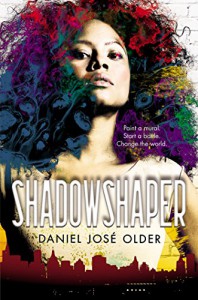

Shadowshaper
by Daniel José Older
Shadowshaper brings richer cadences to a familiar tune. Many aspects are familiar to readers of urban fantasy and young adult: a secret world of magic, a naive heroine who discovers her own unique powers, and burgeoning romance. However, Older describes a fuller, more vibrant city than the standard cookie-cutter urban fantasy fare: the mixing and clash of cultures, mutual distrust with interloping police, stark contrasts in race and socioeconomic status huddled side by side, and deepening tensions over gentrification. One of the central themes of the story is the line between respect for other cultures and appropriation.
Cultural heritage pervades the very magic of Shadowshaper: while the mechanism may be newer, the magic itself embraces tradition. With the magic of a shadowshaper, street art can literally come to life. Shadowshapers can paint forms that spirits--ghosts of the departed as well as other more elemental forces-- can inhabit. But recently, something has been going wrong: shadowshapers are disappearing or losing their minds, murals are losing their vibrancy, and haints are stalking the streets. Sierra Santiago may be new to the world of shadowshapers, but she soon finds herself an integral part in the race to save them. Somehow, her hunt hinges upon finding a white academic who disappeared while studying the shadowshapers and their traditions. And this itself becomes one of the key questions of the book. As one character puts it,
"Who gets to study and who gets studied, and why? Who makes the decisions, you know?"
In one of my favourite discussions of the issue, Sierra's friend decides to turn the tables:
(show spoiler)"If this Wick cat do all this research about Sierra's grandpa and all his Puerto Rican spirits, I don't see why I can't write a book about his people. Imma call it Hipster vs. Yuppie: A Culturalpological Study."
Sierra is Puerto Rican, and much of her own teenage angst deals with her discomfort over societal stereotypes, racism, and sexism, even from her own family. Her aunt, in particular, criticizes her "nappy" hair and her interest in a Cuban boy, warning her to stay away from boys who are "Darker than the bottom of your foot." From one of my favourite scenes:
"Once when she was chatting with some stupid boy online, she described herself as the color of coffee with not enough milk. [...] The worst part about it, the part she couldn’t let go of, was that the thought came from her. Not from one of the teachers or guidance counselors whose eyes said it again and again over sticky-sweet smiles. Not from some cop on Marcy Avenue or Tía Rosa. It came from somewhere deep inside her. And that meant that for all the times she’d shrugged off one of those slurs, some little tentacle of them still crawled its way toward her heart. Not enough milk. Not light enough. Morena. Negra. No matter what she did, that little voice came creeping back, persistent and unsatisfied.
Not enough."
Racism isn't simply something Sierra experiences from her family; it's all around her, accosting her from the media, from her family, from the second looks she gets walking in the "gentrified" parts of town, from her own eyes when she looks in a mirror. And her journey towards self-acceptance is learning to push back against those who wish to mold her into their ideal, to see herself as enough. As she tells her aunt:
I don’t care about your stupid neighborhood gossip or your damn opinions about everyone around you and how dark they are or how kinky their hair is. You ever look in the mirror, Tia? "
You ever look at those old family albums Mom keeps around?” Sierra went on. “We ain’t white. And you shaming everyone and looking down your nose because you can’t even look in the mirror isn’t gonna change that. And neither is me marrying someone paler than me. And I’m glad. I love my hair. I love my skin.”
Shadowshaper is easily one of the most interesting and meaningful YA books I've read in years. If you're a fan of urban fantasy, young adult fiction, or simply books that embrace vibrant diversity, Shadowshaper is well worth a look.

 11
11




